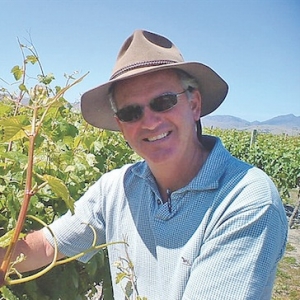When Philip Gregan and myself sat down to discuss who or what should be the recipient of this year’s New Zealand Winegrower Personality of the Year, he was quick to point out the back story behind vintage 2014 – mechanical thinning.
“We all know the story of vintage 2014. A benign growing season led to a crop larger than anticipated. In response there was an unprecedented level of crop thinning including the widespread use of mechanical thinning for the first time in New Zealand. So personally I believe those involved in the mechanical thinning trials are the real personalities of the year.”
And one name that came to mind, was the individual who persevered and led the push to undertake mechanical thinning trials here in New Zealand – Dominic Pecchenino.
So meet our Personality of the Year, Marlborough based viticulture consultant, Dominic Pecchenino (pictured).
Californian born, Pecchenino has been in New Zealand since 1994, (with a short stint back to America in the late 90s.) With a masters degree in Plant Science and Viticulture he came out to this part of the world as the Matador Estate Vineyard Manager. That role saw him also working closely with viticulturists in Australia, via a relationship with Pecador Estate (Langhorne, Sth Australia), where he was a consultant.
His experience of overseas technology has been a major advantage when it comes to looking at the New Zealand viticulturual scene. There were technical aspects being undertaken in both America and Australia, that he thought could be taken on board over here.
One of those was the possibility of mechanical thinning, which had been undertaken successfully in Australia.
In 2006 Pecchenino told me; “I have been pushing for some time to research the possibility of mechanical thinning in New Zealand. It worked so well in Australia and I couldn’t see why it wouldn’t be the same over here. As growers we need to have the ability to use if confidently, especially given how much of a problem labour is in places like Marlborough.”
At the time he was a member of the NZW board, (he still is and is the Chair of the Research Committee), and suggested that they bring over Dr Mark Kristic, from the Australian Grape and Wine Research and Development Corporation. Kristic confirmed that there was no reason mechanical thinning wouldn’t be as successful here as it is in Australia, but he did recommend that a trial be undertaken to iron out any varietal issues.
Pecchenino suggested that Plant and Food put together a proposal to the board, to gain funds for a two-year trial, which was successful.
Current head of Research for NZW, Simon Hooker says he remembers the concerns that were raised prior to the trial.
“We wanted to monitor the level of botrytis within the thinned vines, because given the vines were being shaken, we were concerned that it could be a bit of a disaster. While Spain and Australia had never had any issues, we realised that they were also very different climates, much drier and less susceptible to botrytis.”
What happened, defied all belief Hooker says.
“We couldn’t believe the botrytis results, there was less in the mechanically thinned blocks than there was in the controls. So we decided that we needed to follow those trials up in the second year and we got the same results.”
The Research Committee then suggested that Plant and Food apply for extra funding from the Sustainable Farming Fund , which resulted in the trials being continued for a further three years, ending only in June this year. And what a year to end on. The yields were high, especially in Marlborough and growers were faced with having to remove crop in the most economic and sustainable way. Mechanical thinning came to the fore, and whereas the previous year’s trials had involved tens of hectares, in 2014 that rose to close to 2,500 hectares in Marlborough alone. Sauvignon Blanc was the varietal where it was used predominantly, although Pinot Noir, Pinot Gris and Riesling were also mechanically thinned, providing the research team with an abundance of information.
The initial results showing it aided in lowering botrytis risk has continued and as a consequence, growers now have a new, sustainable and easy way to not only control yield, but also manage botrytis.
Whether any of this research would have been undertaken without the single-minded attitude of Pecchenino is uncertain. Hooker says it is hard to imagine how the 2014 vintage would have gone, if manual thinning was the only option left for growers.
“What would the industry have done last vintage,” he said. “Would there have been enough labour to take the crop back? As for the research showing the Botrytis control, that has been extremely interesting. It’s real and mechanical thinning is now another tool in the toolbox for growers. It is a sustainable botrytis management, that even if the crop levels don’t need controlling, can still be used to get rid of trash and the potential of botrytis outbreaks.”
Hooker says Pecchinino’s vision came from his overseas experience.
“He had a real vision that came through those experiences. He also had the expertise that drove the research. And as the Chair of the Research Committee, he brings a great balance of governance and practical experience.”
Pecchenino has played a major role not only as a member of the NZW Board, but also at a local level, being a board member of Wine Marlborough and the Chair of the Board for three years. He is often called on for his practical skills and international experience. And while he may downplay his role in the overall results from the mechanical thinning trials, he well deserves the title of Personality of the Year for his drive to ensure it came to fruition in New Zealand.
There are a number of other people who also deserve to be mentioned within this story – they are the research team who undertook the trials over the past five years.
They are; Simon Hooker, Mark Allen, Mike Trought and Dion Mundy.












